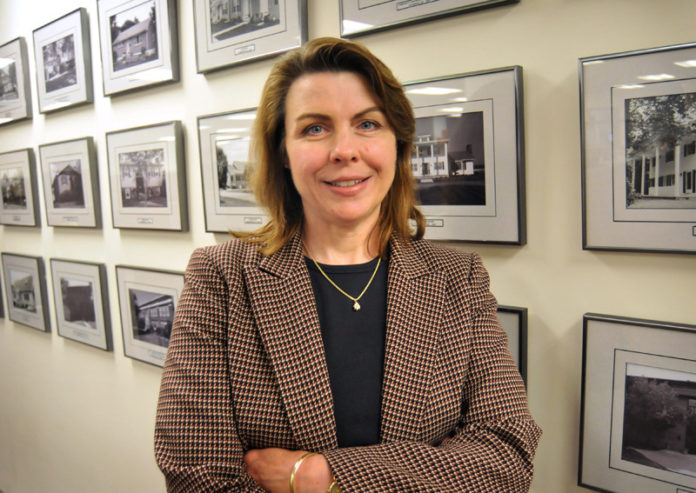
The health care industry’s extraordinary challenges provide Debra M. Paul, president and CEO of Fellowship Health Resources Inc., myriad opportunities to practice her finance and management skills. FHR is a Lincoln-based nonprofit that provides behavioral health care services in seven states to individuals with severe persistent mental illness and substance abuse. Retained by FHR as a consultant in January 2012, Paul was named chief financial officer one month later, and promoted to lead the organization in July 2013.
Finding the “sweet spot” between fulfilling an organization’s mission and evaluating the delivery of services is a battle. “Conversations [about budgets and finances] with the leadership team month after month … can be draining,” acknowledged Paul, who identified Studio 35 and a peer-services program as two initiatives that set FHR apart. Studio 35 offers alternative therapies such as music, dance, visual arts and horticulture to clients in FHR’s 70-plus programs. Twenty-five former FHR clients work as peer specialists with clients who might relate better to individuals with the “lived experiences” of mental illness, said Paul.
How a CEO disseminates information – whether terrific or troublesome – is critical. Paul’s leadership style is collaborative and transparent, noted Pierre La Perriere, an FHR board member. With more than 650 employees, Paul introduced town hall meetings – for board members and employees at all levels and on all shifts – “to share results, solicit feedback and galvanize action,” wrote La Perriere in his letter supporting Paul’s nomination.
Those meetings and additional initiatives – “Making a Difference,” an employee-recognition program; the Balanced Scoreboard, a tool to evaluate specific performance measures and goals; and an internal video series to communicate with all staff members – demonstrate Paul’s “open and engaging communication style and philosophy that supersedes chain of command,” wrote nominator Constance A. Howes, executive vice president for women’s health, Care New England Health System. Employees “across seven states, who previously acted as separate entities,” Howes wrote, “are now part of one coherent team focused on the same organizational goals and achievements.” Establishing those connections with FHR’s scattered employees was especially noteworthy, added Howe, as Paul succeeded the former CEO, Joe Dziobek, whose tenure was 29 years.
As FHR’s chief financial officer, Paul strategically led the executive team in an essential fiscal turnaround, helping the organization move from a 2012 $1.1 million loss to a 2013 year-end gain of nearly $117,000. The entire organization was involved in meeting that objective, said Paul, who holds undergraduate and master’s degrees in business from Bryant University in Smithfield. The four-month process included some staff and program reductions and cutting salaries and expenses, all of which was communicated companywide through a precisely coordinated plan.
“It was like running a war,” Paul said. “I didn’t want all the gunfire to happen as this was rolling out.”
Now on solid fiscal ground and in the first year of a three-year strategic plan, FHR hopes to expand some of its “best practices” programs, such as its children’s program in Delaware, into several states in which it operates. Experienced in running successful clubhouses – an extension of vocational service and the recovery process where clients develop skills to re-enter the workforce and the community – FHR approached Harbor House, an independent clubhouse in Rhode Island that had been scheduled to close in late March due to insufficient funds. Instead, Harbor House will operate as an independent clubhouse and be part of FHR.
As Women & Infants’ CFO from 2006 through 2011, Paul directed her laser-like focus on the hospital’s finances and mission to develop a strategic financial plan. Not only did she help to gain approval for a $77 million building addition and obtain $30 million in debt financing, Paul reduced expenses and increased revenue by $15 million, to realize a 3.3 percent operating margin.
Of her management style, Paul said, “I lead from my heart, and I lead by consensus. I have a terrific leadership team that is not afraid to speak up.” Her husband is her biggest supporter and her two children the source of her strength, said Paul, who currently serves on Coastway Community Bank’s board of directors, and belongs to the American Institute of Certified Public Accountants and the Rhode Island Society of Certified Public Accountants.
Committed to changing public perceptions and removing the stigma around mental health issues, Paul said, “Many individuals receiving mental health services lead productive and successful lives. The path to recovery is long and winding,” and sufficient funding for mental health services is essential.












